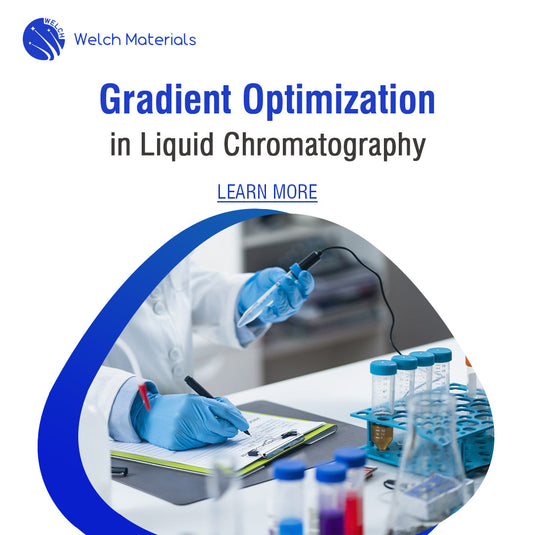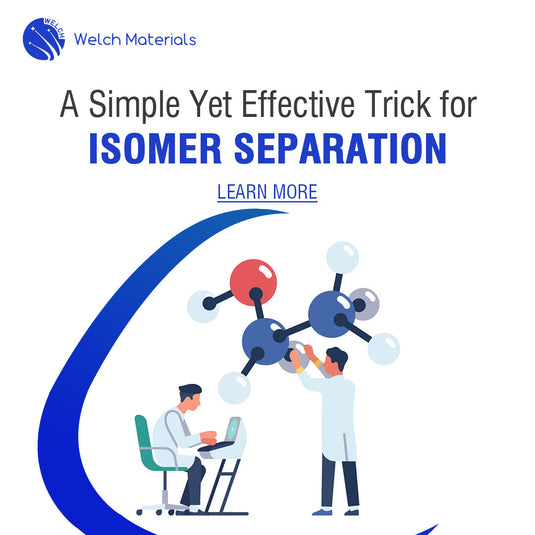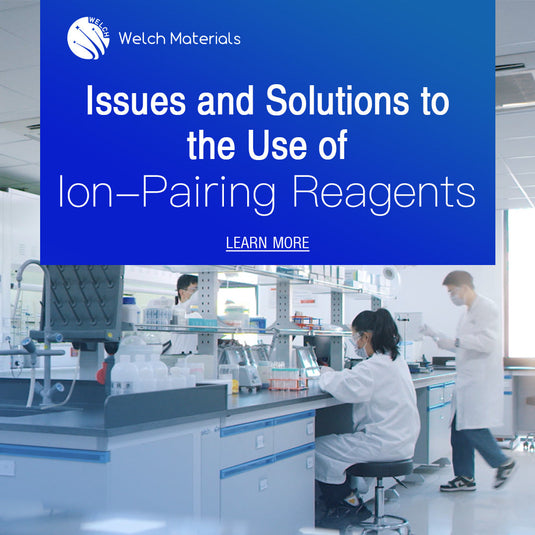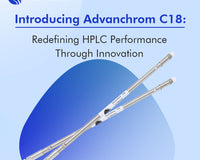Knowledge Base
-
![[Readers Insight] Mobile Phase Selection in Method Development: How to Optimize](//www.welch-us.com/cdn/shop/articles/mpoptimize-1080-1020_535x.jpg?v=1762394840)
[Readers Insight] Mobile Phase Selection in Method Development: How to Optimize
In method development, the selection of mobile phases is an important part to success. This article discusses thoroughly different mobile phases and their use in HPLC and LC-MS, and provides recommendations for initial mobile phase choices. -

A Premier Alkaloid: Nicotine and the Strategy for Developing Its Determination Method
Nicotine analysis is notoriously challenging due to its weak retention on conventional columns. This article shares a practical UHPLC-MS method using the Welch Ultisil HILIC Amphion II column, detailing the development approach, chromatographic conditions, and key advantages for reliable nicotine detection. -
![[Reader Insights] Acidic or Basic? Read Analyte Structure First When Developing a Method](//www.welch-us.com/cdn/shop/articles/acidic-basic0911-1080_6eed96a2-c485-4d8d-bda3-11ab5f2f0026_535x.jpg?v=1765523219)
[Reader Insights] Acidic or Basic? Read Analyte Structure First When Developing a Method
In this article, we discuss how to read molecular structure to assess an analyte’s acidic or basic character and use that insight to design starting chromatographic methods. You will find practical, rule-based criteria, clear decision points for method setup, and a focused real-world example that illustrates structure-driven choices. -
![[Readers Insight] The Starting Point in Method Development](//www.welch-us.com/cdn/shop/articles/starting-point-1080-822_535x.jpg?v=1762394819)
[Readers Insight] The Starting Point in Method Development
Method development often begins with uncertainty—especially when faced with unknown compounds and no literature guidance. This article examines a pharmacopoeial method as a case study, highlighting its chromatographic settings, analyzing potential limitations, and considering improvements. Through this, readers gain insight into the logical framework behind choosing starting conditions. -
![[Readers Insight] Stop Being a Lab Robot: Mastering National Standards in HPLC Analysis](//www.welch-us.com/cdn/shop/articles/lab-robot-1080_535x.webp?v=1761628398)
[Readers Insight] Stop Being a Lab Robot: Mastering National Standards in HPLC Analysis
Executing HPLC methods mechanically limits your potential as a chromatographer. This article breaks down an example method to show how understanding analyte chemistry, matrix effects, and solvent roles empowers you to troubleshoot and optimize, not just follow. -
![[Readers Insight] How to Quickly Establish Robust HPLC Analytical Methods: A 5-Step Expert Guide](//www.welch-us.com/cdn/shop/articles/webp_03042904-1b2e-4fcd-8803-6dc1c58818a8_535x.webp?v=1765523545)
[Readers Insight] How to Quickly Establish Robust HPLC Analytical Methods: A 5-Step Expert Guide
This practical article guides new chromatographers through five essential steps to build robust HPLC methods: structural analysis, solvent selection, signal enhancement, elution optimization, and method validation. -
![[Readers Insight] Chromatographic Separation Strategies for Multi-Component Analysis](//www.welch-us.com/cdn/shop/articles/1080-multi-component_535x.jpg?v=1761629958)
[Readers Insight] Chromatographic Separation Strategies for Multi-Component Analysis
Mass spectrometry simplifies multi-component analysis, but chromatographic separation remains essential for challenging cases. This article explores enhancements in gradient elution, column selection, temperature, flow rate, and mobile phase composition for separation efficiency and resolution. -

Gradient Optimization in Liquid Chromatography
In this article, we explore key considerations in gradient method development, and witness how optimizing gradient elution in HPLC is key to achieving efficient separation through a real-world case study. -

A Simple Yet Effective Trick for Isomer Separation
In this article, we explore a simple yet effective trick in the elution program for isomer separation, with two examples to show how this trick works. -

Issues and Solutions to the Use of Ion-Pairing Reagents
Explore the mechanism of ion-pairing reagents, and common issues and solutions when using ion-pairing chromatography.






![[Readers Insight] Mobile Phase Selection in Method Development: How to Optimize](http://www.welch-us.com/cdn/shop/articles/mpoptimize-1080-1020_535x.jpg?v=1762394840)

![[Reader Insights] Acidic or Basic? Read Analyte Structure First When Developing a Method](http://www.welch-us.com/cdn/shop/articles/acidic-basic0911-1080_6eed96a2-c485-4d8d-bda3-11ab5f2f0026_535x.jpg?v=1765523219)
![[Readers Insight] The Starting Point in Method Development](http://www.welch-us.com/cdn/shop/articles/starting-point-1080-822_535x.jpg?v=1762394819)
![[Readers Insight] Stop Being a Lab Robot: Mastering National Standards in HPLC Analysis](http://www.welch-us.com/cdn/shop/articles/lab-robot-1080_535x.webp?v=1761628398)
![[Readers Insight] How to Quickly Establish Robust HPLC Analytical Methods: A 5-Step Expert Guide](http://www.welch-us.com/cdn/shop/articles/webp_03042904-1b2e-4fcd-8803-6dc1c58818a8_535x.webp?v=1765523545)
![[Readers Insight] Chromatographic Separation Strategies for Multi-Component Analysis](http://www.welch-us.com/cdn/shop/articles/1080-multi-component_535x.jpg?v=1761629958)


